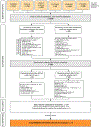Palliative Care in Early Dementia
- PMID: 38848792
- PMCID: PMC12060741
- DOI: 10.1016/j.jpainsymman.2024.05.028
Palliative Care in Early Dementia
Abstract
Background: Palliative care is recommended for all people with dementia from diagnosis through end-of-life. However, palliative care needs and effective elements of palliative care are not well-defined for the earlier stages of dementia.
Objective: To systematically map current research on palliative care early in the disease trajectory of dementia.
Design: Scoping review of scientific literature.
Data sources: PubMed, CINAHL, EMBASE, Cochrane, PsycINFO, Web of Science.
Review methods: We included studies published in English over the last decade (through March 2022) that focused on palliative care in early stages of dementia and targeted outcomes in palliative care domains. Two authors independently screened abstracts and full texts and scored the quality of included studies using tools by the Joanna Briggs Institute.
Results: Among the 77 papers reviewed, few addressed early stages of dementia specifically. We found that: 1) While "early" palliative care was not well-defined in the literature, evidence indicated that palliative care needs were present at or before diagnosis and across the trajectory. Notable opportunities for palliative care arise at 'tipping points' (i.e., when symptoms, functional status, or caregiving needs change). 2) Palliative care needs in early dementia include advocacy for goal-aligned care in the future, reassurance against the threat of negligence and abandonment by caregivers, planning for future scenarios of care (practical, individual, and relational needs), and establishing of long-term relationships with providers entrusted for care later in disease. 3) Elements of effective palliative care in early dementia could include dementia-specific ACP and goals of care discussions, navigation for building a network of support, provision of tools and resources for family, tailored care and knowledge of the person, and well-prepared dementia-care providers. The scarcity of palliative care studies aimed at early disease indicates a gap in the evidence in dementia care.
Conclusion: The literature on palliative care in early dementia is sparse. Future studies should focus on assessment tools for optimizing timing of palliative care in early dementia, gaining better understanding of patient and family needs during early phases of disease, and providing training for providers and families in long-term relationships and communication around goals of care and future planning.
Keywords: Mild cognitive impairment; advance care planning; early dementia; palliative care.
Published by Elsevier Inc.
Conflict of interest statement
This work was supported by the Department of Veterans Affairs, Veterans Health Administration, Office of Academic Affiliations VA Quality Scholars Advanced Fellowship Program (Program Award Number 3Q082019C). The views expressed herein are those of the authors and do not necessarily represent the views of the US Department of Veterans Affairs, the US government, the University of California, San Francisco, or other affiliated organizations.
References
-
- Ahluwalia SC, Chen C, Raaen L, et al. A systematic review in support of the national consensus project clinical practice guidelines for quality palliative care. J Pain Symptom Manage 2018;56:831–870. - PubMed
Publication types
MeSH terms
Grants and funding
LinkOut - more resources
Full Text Sources
Medical
Miscellaneous


